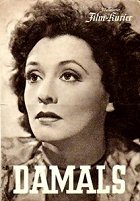Reżyseria:
Rolf HansenScenariusz:
Rolf HansenZdjęcia:
Franz WeihmayrObsada:
Zarah Leander, Rossano Brazzi, Paul Klinger, Walter Gross, Vera Complojer, Victor Janson, Olaf Bach, Hans Stüwe, Agnes Windeck, Herbert Hübner, Leo Peukert (więcej)Recenzje (1)
The final film of Zarah Leander's first German career. The situation was serious. Leander came to Germany shortly before the war and after her first three successful films, she signed a second contract. She wanted half of her salary in Swedish kronor and earned more overall than other film notables, including directors. Leander was aware of her value. She had experienced poverty and divorce and she had two children, and therefore took great care to make sure that a similar situation would never happen again. She invested all the money she earned in Austria and Germany in a small estate in Lönö. But in 1942 it was no longer possible to live in Berlin. She did shoot some of her exteriors in Rome, but her Berlin house was destroyed and the Germans no longer wanted to pay even half of her salary in any currency other than Reichsmarks. Leander couldn't agree to that and left after the premiere of At That Time. For another six months, she rejected more and more scripts, drawing on the fact that for economic reasons her films were not withdrawn from the movie theaters until the end of the war. Although she did not become a Reich citizen at Goebbels' request, the profits from the coffers helped finance the last years of the war. This caused embarrassment in Sweden, but due to the proclaimed neutrality of the country, it was possible to find common ground between Leander and her home audience soon after the war. Leander's understanding was that her main income came from the music industry and that films were only a fraction of her success. After all, the financial balance sheet spoke clearly. At That Time is, by all means, Leander's third Reich film set in the present day, but to make it less harsh than the previous one The Great Love, we go back to 1920 and experience with the main character her entire turbulent fate leading up to the prison cell bars. It's an interesting detective mosaic with many question marks, many exotic settings, and of course great songs. The best of them are "Jede Nacht ein neues Glück" and "Einen wie dich könnt ich lieben." Her acting partners are a bit weaker, Hans Stüwe (The Life and Loves of Tschaikovsky, The Way to Freedom) never brought happiness to Leander's characters, while Rossano Brazzi just reminds us of the cooperation between the Reich and Duce's Italy and even the second-rate Hans Brausewetter has a supporting role. From that point of view, it's no win and Leander has to act the whole film practically alone. Some of the costumes designed for musical scenes are rewarding, but unfortunately, the contemporary fashion of the time prevails, although Leander was the queen of historical (or historicizing) costumes. Due to further political developments, Leander could not be reunited with her German audience until the 1950s, but that is another story.
()

